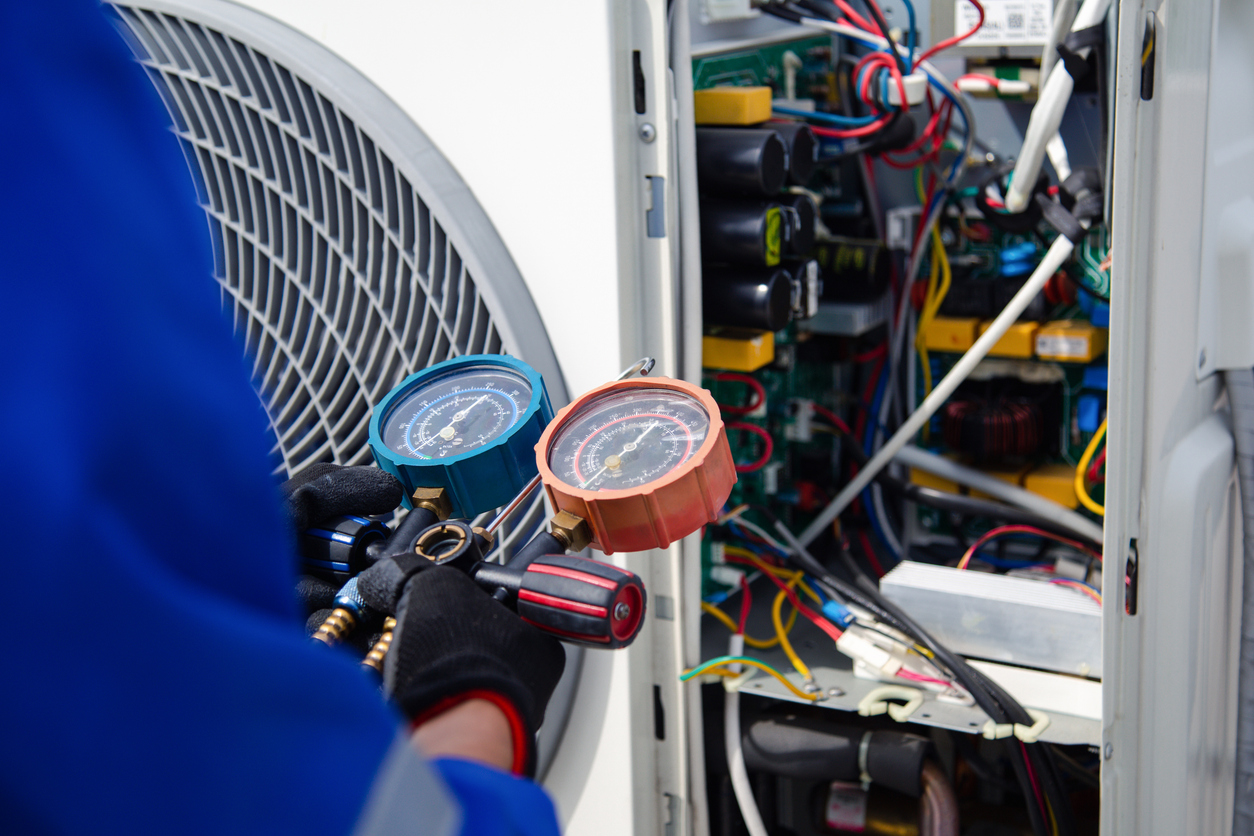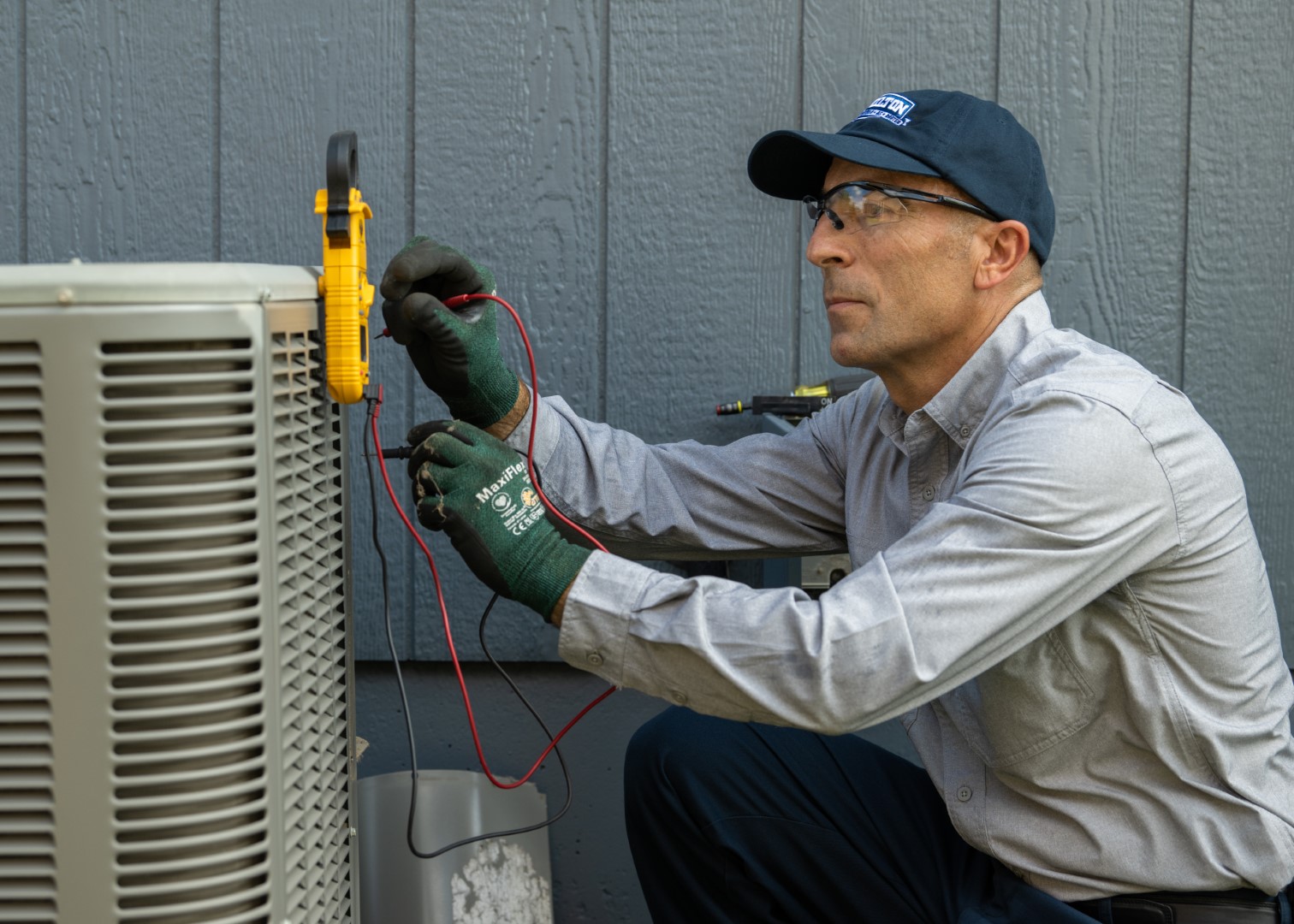Why you should schedule seasonal service with an HVAC contractor
Everything about A/c: Identifying Common Issues and Effective Air Conditioner Repair Service Techniques
HVAC systems are critical for preserving interior convenience. Comprehending their elements and capability is necessary for identifying usual problems. Home owners typically deal with issues such as ineffective cooling, odd odors, or climbing power prices. These indications can suggest underlying issues that may require attention. Exploring do it yourself troubleshooting techniques can be advantageous, yet recognizing when to seek professional assistance is equally crucial. What actions can be required to assure resilient efficiency?
Understanding Your HVAC System: Elements and Capability
A HVAC system, commonly thought about the foundation of indoor climate control, includes a number of key elements that interact to regulate temperature and air quality. The primary aspects include the heating unit, air flow system, and a/c device. The heating device, generally a furnace or central heating boiler, produces warmth during cooler months, while the a/c device cools down indoor spaces during the summertime.

Typical Heating And Cooling Troubles House Owners Experience
Property owners typically deal with numerous usual a/c issues, including irregular temperature level circulation throughout their space. Furthermore, unusual noises during procedure can indicate underlying problems that require focus. Dealing with these problems immediately is important for maintaining excellent system performance.
Inconsistent Temperature Level Circulation
Many households experience the frustrating problem of irregular temperature level circulation, where particular rooms really feel uncomfortably cozy while others remain as well cold. This trouble usually develops from a variety of variables, including bad insulation, obstructed vents, or an incorrectly sized HVAC system. When ducts are not appropriately secured or when furnishings blocks air movement, some spaces might obtain inadequate cooling. Furthermore, thermostat placement can significantly impact temperature level regulation; a thermostat situated in a sunlit location may misstate the overall temperature level of your house. Normal maintenance, including cleaning filters and ensuring ductwork is clear, can aid alleviate these discrepancies. House owners might likewise take into consideration zoning systems to better control temperature levels throughout various areas of the home, promoting a more comfy living atmosphere.
Unusual Noises Throughout Operation
When an a/c system runs, unusual sounds can suggest underlying concerns that require attention. Home owners might experience a series of sounds, such as grinding, squealing, or hissing. Grinding noises commonly signal damaged bearings or elements, while squealing can recommend loose belts or parts needing lubrication. Hissing might indicate a cooling agent leak, which can compromise the system's efficiency. Furthermore, banging sounds might point to loose ductwork or a concern with the blower fan. Each of these sounds works as a warning, prompting house owners to investigate additionally. Ignoring these indicators can bring about more significant issues and costly repair work. Regular upkeep and prompt focus to unusual sounds can boost system long life and performance, guaranteeing a comfortable living atmosphere.
Indicators That Indicate Your Air Conditioning Demands Fixing
How can one tell if their air conditioning system needs repair work? Numerous signs may suggest underlying problems calling for expert interest. If the Air conditioning fails to cool the space successfully, it may recommend a cooling agent leak or compressor malfunction. Furthermore, a rise in power costs without corresponding use modifications can indicate ineffectiveness in the system. Homeowners ought to also be sharp to unusual smells rising from the unit, which could suggest mold and mildew development or electric problems. If the AC often cycles on and off, it could be an indication of a malfunctioning thermostat or other mechanical issues. Ultimately, the presence of water merging around the unit can show a stopped up drainpipe line. Identifying these signs early can save money and time, ensuring that the air conditioning system operates successfully and successfully.
DIY Troubleshooting Techniques for Cooling And Heating Issues
When encountering heating and cooling problems, home owners can utilize a number of do it yourself troubleshooting strategies to determine the trouble. Secret techniques consist of examining thermostat setups, examining air filters, and reviewing drain problems. These steps can assist identify usual breakdowns prior to anonymous looking for expert support.
Examining Thermostat Settings
What actions should house owners require to ensure their thermostat settings are correct? First, they should validate the thermostat is set to the wanted temperature level and setting, whether heating or air conditioning. Looking for a clear screen and confirming the thermostat is not set to "hold" or "holiday" setting is vital. Home owners ought to also verify that the thermostat is degree and set up in an area without drafts, direct sunlight, or other temperature level influences. Furthermore, recalibrating the thermostat can help provide accurate readings. If the thermostat operates batteries, changing them may fix any kind of concerns. By methodically examining these aspects, homeowners can typically identify and fix thermostat-related problems, advertising ideal HVAC system efficiency.
Inspecting Air Filters
Air filters play a vital function in keeping suitable HVAC important site performance. They trap dust, allergens, and other particles, ensuring tidy air flow. In time, filters can become stopped up, lowering airflow and effectiveness. To inspect air filters, people need to first locate the filter, frequently found in the return air duct or near the heater. When situated, they should review the filter's condition-- if it appears dirty or tarnished, it likely requirements replacement. Many filters require changing every 1-3 months, relying on use and environmental elements. Routine inspection and timely replacement of air filters not just improve air top quality yet also extend the lifespan of heating and cooling systems, avoiding possible breakdowns and expensive repair services.
Reviewing Drain Issues
How can home owners efficiently determine and resolve drainage concerns within their HVAC systems? First, they must examine the condensate drainpipe line for blockages or obstructions, which can result in water buildup. House owners might utilize a wet/dry vacuum to get rid of any type of particles obstructing the line. Next, examining the drain frying pan for rust or leakages is vital, as a damaged pan can create water to overflow. Regular cleaning of the drainpipe line with a combination of vinegar and water aids protect against future obstructions. Additionally, making certain correct slope of the drainpipe line advertises reliable water circulation. If these DIY methods do not settle the issue, seeking advice from a specialist heating and cooling specialist might be necessary to avoid prospective water damage and system failing.
When to Call a Specialist for Air Conditioning Repairs

While some air conditioner issues can be managed via do it yourself methods, there are situations where calling a professional comes to be vital. House owners should seek professional assistance when they encounter relentless issues, such as insufficient air conditioning, weird noises, or unusual smells rising from the device. These symptoms may suggest much deeper problems that require specialized understanding and tools to diagnose and fix properly.

Preventative Upkeep Tips for Heating And Cooling Longevity
Regular preventative maintenance can substantially enhance the longevity of cooling and heating systems. Homeowners should set up annual inspections by qualified specialists to assess system effectiveness and identify possible concerns. Regularly altering see here or cleaning up air filters is necessary, as this warranties proper air movement and lowers strain on the system. Furthermore, inspecting and securing ductwork avoids energy loss and improves overall performance.
It is additionally advisable to keep the exterior device free from particles and greenery, enabling for peak air movement and heat exchange. Property owners ought to examine the condensate drain for obstructions to avoid water damages and mold growth. Preserving suitable thermostat settings and utilizing programmable alternatives can boost energy efficiency. Recording maintenance tasks assists track service background and can assist in recognizing recurring problems. By complying with these preventative actions, people can optimize the efficiency and life-span of their heating and cooling systems
Regularly Asked Inquiries
Just how Commonly Should I Replace My HVAC System Filters?
HVAC system filters need to normally be replaced each to three months, relying on use, filter kind, and environmental factors. Normal substitute assists keep effectiveness and air quality, guaranteeing peak system performance throughout the year.
What Dimension Heating And Cooling System Do I Required for My Home?
To identify the ideal cooling and heating system dimension for a home, one must take into consideration square video, insulation top quality, and local environment. Consulting an expert can help guarantee optimal effectiveness and convenience for the particular living area.
Exist Eco-Friendly Heating And Cooling Options Available?
Yes, environmentally friendly a/c options are available, including energy-efficient heatpump, solar-powered systems, and geothermal home heating. These options reduce power intake and ecological influence, advertising sustainability while maintaining efficient climate control for property and commercial spaces.
Just How Can I Improve My a/c System's Energy Performance?
To boost heating and cooling power effectiveness, one can frequently maintain the system, seal air leaks, set up programmable thermostats, utilize energy-efficient filters, and warranty adequate insulation throughout the home to minimize power usage and enhance efficiency.

What Is the Average Life-span of a Cooling And Heating System?
The typical lifespan of an a/c system commonly varies from 15 to 25 years, depending upon variables such as maintenance, usage, and the high quality of setup. Routine maintenance can substantially prolong its functional durability.
Final thought
In recap, a complete understanding of HVAC systems encourages home owners to recognize typical concerns and address small issues successfully. Acknowledging indicators of breakdown, using do it yourself fixing techniques, and focusing on routine maintenance can boost system efficiency and performance. Nonetheless, when encountered with complex repair work, employing professional help is critical to assure safety and security and durability. By fostering recognition and aggressive treatment, people can enjoy a comfy indoor setting while lessening unanticipated expenses related to cooling and heating failings.